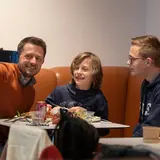
Leveraging the Yale Entrepreneurship Ecosystem
Loick Fenaux ’19 discusses the resources across Yale that are helping him to develop as an entrepreneur in the food space.
I was born and grew up in Belgium. At home we spoke French and English, and I studied in Dutch. As a family we traveled a lot to the U.S. and Spain and lived there for months at a time. Taking the time to participate in local life made me love the differences of cultures and pushed my curiosity about how “things” worked around the world. This led me to study food science and engineering in Brussels and Canada. I chose these studies because, as much as cultures might differ from each other, food always plays a central role in any society.
After graduation I started working in the natural food ingredient industry. The food industry has a large impact both people and the environment. Food ingredient suppliers sit between farmers and end consumers, so they are concerned about the sustainability of their raw material as well as the health impact of their ingredients. This is all tied together by emotions. Recently, many startup companies have found ways to disrupt the food industry by being more conscious about the ingredients they use—a field where I feel I can help greatly. This need—and my hope for healthier and more sustainable food—have strongly attracted me to these entrepreneurs.
Tapping into Resources Across Yale University
When I came to Yale I was looking to discover what the university had to offer. I made some valuable discoveries: First, I need to mention the team at Tsai CITY (Emma Funk, Justin Freiberg, Tagan Engel, and Cass Harvey). They embraced my enthusiasm and worked hard to create a place for me, so I could apply what I learned in class. Second, Yale has also opened many doors with powerful influencers that I have now befriended and with whom I will be working on various projects. Last, my classmates are a true source of motivation. They all excel in their respective industries but remain curious of what I do. This makes them great critics, which helps me improve a lot.
Delivering the Intensive on Food at Tsai CITY
At Tsai CITY, I worked on the Intensive on Food, which was rewarding. The Intensive was meant to answer the demand from Yale students looking to start a food company. Yale develops leaders for society, which food is a huge part of. It is only natural that students attracted by the mission of Yale are also attracted by this industry. During the Intensive, our team defined five topics, and we invited various entrepreneurs to share their experience. At the end of the five weeks, all 22 participants pitched their ideas to a larger public. Even today, I still work with some of the students to help them the best I can with networking, advice, or simply bouncing ideas around.
Integrating What I’ve Learned into My Current Job
As a MBA for Executives student, I’m working full time and studying a course that’s equivalent to that of the full-time MBA program. I knew that these two years were going to be very intense and time consuming. What allows me to pursue all of my projects is that they are all related in some way. My role within my company is to look for new business opportunities, with which networking within the Yale community greatly helps. The classes and assignments are very applicable in our daily job, which also helps. So, networking, my involvement with CITY, and studying all overlap with my work.
Gaining Even Broader Perspective through Global Network Week
I recently attended the Global Network Week at Smurfit, University College Dublin. The topic was “The Future of Food” so I had huge expectations on the content of the week. The way Professor Damien McLoughlin was able to tie in all of the case studies, company visits, and hosts together allowed me to understand how issues around the world are all related. This mix of learning from cutting edge food companies like Glanbia, Kerry, Pete & Gerry’s, and Cainthus, combined with the heritage of most of my Irish classmates helped me reassess a lot of biases I had about what the food industry should look like in the future. My main takeaway is that there is no perfect solution, but by mixing knowledge from different industries and cultures, we will be able to improve what we eat.



